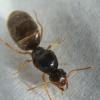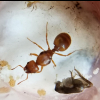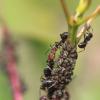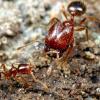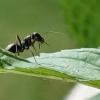- Formiculture.com
- Forums
- Gallery
- Members
- Member Map
- Chat

ANTdrew's Formica subsericea Journal - FormicaFarm Setup
Started By
ANTdrew
, Mar 2 2020 11:11 AM
212 replies to this topic
#81
 Online
-
Posted July 13 2020 - 3:24 PM
Online
-
Posted July 13 2020 - 3:24 PM
Thanks, guys. Anybody else willing to weigh on on the ID of this red girl?
Should I be concerned about the lack of brood in my argentea’s dirt box?
Should I be concerned about the lack of brood in my argentea’s dirt box?
"The ants are a people not strong, yet they prepare their meat in the summer." Prov. 30:25
Keep ordinary ants in extraordinary ways.
Keep ordinary ants in extraordinary ways.
#82
 Offline
-
Posted July 13 2020 - 4:28 PM
Offline
-
Posted July 13 2020 - 4:28 PM
Looks like F. pallidefullva. There doesn't seem to be any hairs on the mesosoma, but workers will help with that.
- ANTdrew likes this
My Main Journal | My Neivamyrmex Journal | My Ant Adoption | My YouTube
Join the TennesseeAnts Discord Server! https://discord.gg/JbKwPgs
#83
 Offline
-
Posted July 13 2020 - 5:31 PM
Offline
-
Posted July 13 2020 - 5:31 PM
Not all Formica in the pallidefulva group look like that. That is quite ignorant. Also, it is most likely pallidefulva as they do have a solid orange morph like that that is only present in the south. The northern variety is black and brown/red.I mean she could be any other species in the pallidefulva group that is present in northern virginia.
I said those present in northern virginia. There arent very many archboldi records up in Northern Virginia. And dolosa, incerta and pallidefulva are all extremely similar.
- AnthonyP163, TennesseeAnts and ANTdrew like this
Hi there! I went on a 6 month or so hiatus, in part due, and in part cause of the death of my colonies.
However, I went back to the Sierras, and restarted my collection, which is now as follows:
Aphaenogaster uinta, Camponotus vicinus, Camponotus modoc, Formica cf. aserva, Formica cf. micropthalma, Formica cf. manni, Formica subpolita, Formica cf. subaenescens, Lasius americanus, Manica invidia, Pogonomyrmex salinus, Pogonomyrmex sp. 1, Solenopsis validiuscula, & Solenopsis sp. 3 (new Sierra variant).
#84
 Online
-
Posted July 24 2020 - 10:43 AM
Online
-
Posted July 24 2020 - 10:43 AM
Update 7-24-2020
I just checked the Formica cf pallidefulva queen I found two weeks ago, and she already has two pupae and a lot of larvae. That's crazy fast!
Still no new brood for my argenteas. Disappointing. Should I be concerned, or are they basically done growing for the season? They keep eating protein for some reason. Grain mites have gotten into their dirtbox, too. It's always something...
I just checked the Formica cf pallidefulva queen I found two weeks ago, and she already has two pupae and a lot of larvae. That's crazy fast!
Still no new brood for my argenteas. Disappointing. Should I be concerned, or are they basically done growing for the season? They keep eating protein for some reason. Grain mites have gotten into their dirtbox, too. It's always something...
Edited by ANTdrew, July 24 2020 - 11:06 AM.
- CatsnAnts and Antkid12 like this
"The ants are a people not strong, yet they prepare their meat in the summer." Prov. 30:25
Keep ordinary ants in extraordinary ways.
Keep ordinary ants in extraordinary ways.
#85
 Offline
-
Posted July 24 2020 - 11:30 AM
Offline
-
Posted July 24 2020 - 11:30 AM
Woah, pupae already.... that was speedy.
Ants I have: Tapinoma sessile(2 queen colony). RED MORPH Camponotus neacticus(now has pupae!), Tetramorium immigrans (x3), Aphaenogaster sp, Temnothorax sp, Brachymyrmex sp. possibly infertile ![]() , Ponera pennsylvanica, and Pheidole morrisi!
, Ponera pennsylvanica, and Pheidole morrisi! ![]()
Other insects: Polistes sp. Queen
Ants I need: Pheidole sp., Trachymyrmex sp., Crematogaster cerasi , Dorymyrmex sp. Most wanted: Pheidole morrisii
#86
 Online
-
Posted July 29 2020 - 10:24 AM
Online
-
Posted July 29 2020 - 10:24 AM
Update 7-29-2020
Absolutely nothing is happening with my Formica argenteas, which is really disappointing. No new brood has shown up in over a month, so I'll ask again: should I be concerned?
Really disappointing, not gonna lie.
My new Formica pallidefulva is growing crazy fast, though! I count 11 pupae and 1 larvae in this photo. I haven't even had her three weeks yet.
- RushmoreAnts and Antkid12 like this
"The ants are a people not strong, yet they prepare their meat in the summer." Prov. 30:25
Keep ordinary ants in extraordinary ways.
Keep ordinary ants in extraordinary ways.
#87
 Offline
-
Posted July 29 2020 - 12:14 PM
Offline
-
Posted July 29 2020 - 12:14 PM
Can't wait for first workers!
Ants I have: Tapinoma sessile(2 queen colony). RED MORPH Camponotus neacticus(now has pupae!), Tetramorium immigrans (x3), Aphaenogaster sp, Temnothorax sp, Brachymyrmex sp. possibly infertile ![]() , Ponera pennsylvanica, and Pheidole morrisi!
, Ponera pennsylvanica, and Pheidole morrisi! ![]()
Other insects: Polistes sp. Queen
Ants I need: Pheidole sp., Trachymyrmex sp., Crematogaster cerasi , Dorymyrmex sp. Most wanted: Pheidole morrisii
#88
 Offline
-
Posted July 29 2020 - 12:20 PM
Offline
-
Posted July 29 2020 - 12:20 PM
My Formica subsericea also decided to hibernate in summer. They had no brood for all of June, and finally started laying eggs again a few weeks ago. I don't know why they do this, I just know it only lasts a few weeks. Same happened with CheetoLord's Camponotus pennsylvanicus and Formica dolosa. His dolosa died, but she always had problems. I am guessing they'll continue to lay eggs in the next few weeks.
- TennesseeAnts and ANTdrew like this
Ant Keeping & Ethology Discord - 2000+ Members and growing
Statesideants.com - order live ants legally in the US
#89
 Offline
-
Posted July 29 2020 - 12:46 PM
Offline
-
Posted July 29 2020 - 12:46 PM
Formica are touchy, despite what is commonly believed. Killing them is unlikely, but they just act weird for many unknown reasons.
- ANTdrew likes this
"God made..... all the creatures that move along the ground according to their kinds (including ants). And God saw that it was good. Genesis 1:25 NIV version
Keeping:
Formica cf. pallidefulva, cf. incerta, cf. argentea
Formica cf. aserva, cf. subintegra
Myrmica sp.
Lasius neoniger, brevicornis
#90
 Offline
-
Posted July 29 2020 - 2:55 PM
Offline
-
Posted July 29 2020 - 2:55 PM
IMO they don’t make the best captive ants. From what I have seen on the forum especially fusca-group. They just are very touchy and sensitive.
#91
 Online
-
Posted August 7 2020 - 10:41 AM
Online
-
Posted August 7 2020 - 10:41 AM
Update 8-7-2020 ![]()
My Formica pallidefulva queen, Bestla, just got her first two nanitics! This took exactly four weeks from when I found her to first workers. Super fast for a big Formicine! I gave them a bit of nectar and some sliced up cricket leg. The queen went right for it after she stopped spazzing out.
Still nothing to update for my Formica argentea. Hope springs eternal....
- AnthonyP163, DJoseph98, TennesseeAnts and 5 others like this
"The ants are a people not strong, yet they prepare their meat in the summer." Prov. 30:25
Keep ordinary ants in extraordinary ways.
Keep ordinary ants in extraordinary ways.
#92
 Offline
-
Posted August 11 2020 - 9:37 AM
Offline
-
Posted August 11 2020 - 9:37 AM
Hey ANTdrew, any update on these girls?
Edited by TechAnt, August 11 2020 - 9:37 AM.
- ANTdrew likes this
My Ants:
(x1) Campontous semitstaceus ~20 workers, 1 Queen
(x1) Camponotus vicinus ~10 workers, 1 Queen (all black variety)
(x1) Tetramorium immigrans ~100 workers, 1 Queen
(x1) Myrmercocystus mexicanus -1 Queen
(x2) Mymercocystus mimcus -1 Queen
(x1) Mymercocystus testaceus ~45 workers, 1 Queen
(x1) Campontous semitstaceus ~20 workers, 1 Queen
(x1) Camponotus vicinus ~10 workers, 1 Queen (all black variety)
(x1) Tetramorium immigrans ~100 workers, 1 Queen
(x1) Myrmercocystus mexicanus -1 Queen
(x2) Mymercocystus mimcus -1 Queen
(x1) Mymercocystus testaceus ~45 workers, 1 Queen
#93
 Online
-
Posted August 11 2020 - 10:20 AM
Online
-
Posted August 11 2020 - 10:20 AM
I’ll put one together. The new queen is kicking butt so far.Hey ANTdrew, any update on these girls?
- TechAnt likes this
"The ants are a people not strong, yet they prepare their meat in the summer." Prov. 30:25
Keep ordinary ants in extraordinary ways.
Keep ordinary ants in extraordinary ways.
#94
 Offline
-
Posted August 11 2020 - 10:58 AM
Offline
-
Posted August 11 2020 - 10:58 AM
Awesome!I’ll put one together. The new queen is kicking butt so far.Hey ANTdrew, any update on these girls?
My Ants:
(x1) Campontous semitstaceus ~20 workers, 1 Queen
(x1) Camponotus vicinus ~10 workers, 1 Queen (all black variety)
(x1) Tetramorium immigrans ~100 workers, 1 Queen
(x1) Myrmercocystus mexicanus -1 Queen
(x2) Mymercocystus mimcus -1 Queen
(x1) Mymercocystus testaceus ~45 workers, 1 Queen
(x1) Campontous semitstaceus ~20 workers, 1 Queen
(x1) Camponotus vicinus ~10 workers, 1 Queen (all black variety)
(x1) Tetramorium immigrans ~100 workers, 1 Queen
(x1) Myrmercocystus mexicanus -1 Queen
(x2) Mymercocystus mimcus -1 Queen
(x1) Mymercocystus testaceus ~45 workers, 1 Queen
#95
 Offline
-
Posted August 11 2020 - 7:40 PM
Offline
-
Posted August 11 2020 - 7:40 PM
Update 8-7-2020
My Formica pallidefulva queen, Bestla, just got her first two nanitics! This took exactly four weeks from when I found her to first workers. Super fast for a big Formicine! I gave them a bit of nectar and some sliced up cricket leg. The queen went right for it after she stopped spazzing out.
Still nothing to update for my Formica argentea. Hope springs eternal....
Right now my Formica subsericea are in the same boat as your F. argentea: no brood, no protein intake. I think I have a similar queen to Bestla, and congrats on the nanitics!
Edited by DJoseph98, August 11 2020 - 7:41 PM.
- ANTdrew likes this
Current Colonies
1 x Camponotus nearcticus (Monogynous), 1 x Crematogaster cerasi (Monogynous), 1 x Formica cf. subsericea (Polygynous Two-Queen), 1 x Formica cf. pallidefulva (Monogynous, single worker),
1 x Lasius cf. americanus (Pleometrotic Founding, now Monogynous), 1 x Tetramorium immigrans (Monogynous)
Current Founding Units
1 x Formica cf. subsericea (Monogynous)
Up-To-Date as of 9/15/2020
#96
 Online
-
Posted August 12 2020 - 7:32 AM
Online
-
Posted August 12 2020 - 7:32 AM
Update 8-12-2020
There is still no real change for my Formica argentea colony. A few of the older workers have passed on to the great ant hill in the sky, but she still has lots of workers in the dirt nest. The mystery for me is that they never refuse protein (they've been going nuts for pre-frozen termites this week). I'm confused why they would still be taking in protein if there is no brood? It could be that there is brood somewhere in the dirt that I'm not seeing. Could another possibility be that some of the workers are tanking up like repletes? Some of them have very distended gasters down in the tunnels.
Here is a look at their set up. The queen is actually in here in the upper right corner tunnels, but she doesn't show in photos, of course:
Bestla is really kicking butt. Most of her nanitics have now eclosed with two pupae remaining. She also laid a big pile of eggs. I went ahead and stuck her tube to a new mini-hearth with mounting putty. She hasn't moved in yet. What a lovely specimen.
- AnthonyP163 and DJoseph98 like this
"The ants are a people not strong, yet they prepare their meat in the summer." Prov. 30:25
Keep ordinary ants in extraordinary ways.
Keep ordinary ants in extraordinary ways.
#97
 Offline
-
Posted August 12 2020 - 11:30 AM
Offline
-
Posted August 12 2020 - 11:30 AM
Nice! Those pallidefulva group Formica are beautiful.
- TennesseeAnts, ANTdrew and Antkid12 like this
Hi there! I went on a 6 month or so hiatus, in part due, and in part cause of the death of my colonies.
However, I went back to the Sierras, and restarted my collection, which is now as follows:
Aphaenogaster uinta, Camponotus vicinus, Camponotus modoc, Formica cf. aserva, Formica cf. micropthalma, Formica cf. manni, Formica subpolita, Formica cf. subaenescens, Lasius americanus, Manica invidia, Pogonomyrmex salinus, Pogonomyrmex sp. 1, Solenopsis validiuscula, & Solenopsis sp. 3 (new Sierra variant).
#98
 Offline
-
Posted August 12 2020 - 12:09 PM
Offline
-
Posted August 12 2020 - 12:09 PM
Nice!
Ants I have: Tapinoma sessile(2 queen colony). RED MORPH Camponotus neacticus(now has pupae!), Tetramorium immigrans (x3), Aphaenogaster sp, Temnothorax sp, Brachymyrmex sp. possibly infertile ![]() , Ponera pennsylvanica, and Pheidole morrisi!
, Ponera pennsylvanica, and Pheidole morrisi! ![]()
Other insects: Polistes sp. Queen
Ants I need: Pheidole sp., Trachymyrmex sp., Crematogaster cerasi , Dorymyrmex sp. Most wanted: Pheidole morrisii
#99
 Offline
-
Posted August 13 2020 - 4:24 AM
Offline
-
Posted August 13 2020 - 4:24 AM
ANTDrew,
In VA your options would be:
Formica incerta (she is not that one, because the thorax lacks the three distinct dark marks - see pic in my Formica pallidefulva journal, 99.9% certainty here)
Formica pallidefulva - most likely - shiny, dorsal surface of thorax look hairless
Formica dolosa - almost certainly not - those are duller, rather furry and rare outside of pine barrens at least in NC - see: https://antwiki.org/...38_dorsal_1.jpg
Formica biophilica - low chance, your specimen doesn't seem hirsute enough - I've never seen a queen of this species but I do know bogs around here where I can find the workers so if you can say the same, could be?
An interesting question I don't know the answer to is: how far can these queens fly outside of the habitat where one finds the colonies? Get blown off course by storms, etc?
To make a solid ID, we could wait for non-nanitic workers, or - you could get a really closeup shot of a few features and post here: dorsal and lateral views of any hairs on the pronotum/propodeum etc., closeup of the face from the front and side. I could at least make an educated guess based on those. Really in this genus it comes down to scape length, macrochaetae (long hairs), and the like, but you need to get a good picture for that.
Since you can see the animal up close (e.g. better than an iPhone pic you could get here) so you have the best chance of making the ID. This paper does a great job of making that easy - google scholar the reference below and you will get a link in there to the revision of the genus. It should be a PDF that anyone can download for free (was for me). Full reference:
Trager, J. C., MacGown, J. A., Trager, M. D. 2007. Revision of the Nearctic endemic Formica pallidefulva group, pp. 610-636. In Snelling, R. R., B. L. Fisher, and P. S. Ward (eds).Advances in ant systematics (Hymenoptera: Formicidae):homage to E. O. Wilson – 50 years of contributions. Memoirs of the American Entomological Institute, 80.
Edited by jplelito, August 13 2020 - 4:25 AM.
- TennesseeAnts and ANTdrew like this
#100
 Online
-
Posted August 21 2020 - 6:49 AM
Online
-
Posted August 21 2020 - 6:49 AM
Update 8-21-2020
On 8/14, I successfully moved my (assumed) Formica pallidefulva colony into a THA mini-hearth. I did my usual procedure of sticking their tube to the entrance hole using mounting putty and letting them explore for a few days before exposing them to sunlight to force the final move. It all went smoothly until I removed the tube from the putty and two nanitics bolted out on to my patio table. Thankfully, my aspirator was nearby, and I vacuumed them up easily. Formica are so psycho.
The nanitics were too shy to forage, so I've been dropping insect bits down the tube into their nest. On 8/19, I was happy to see some of these bug bits put up in a garbage pile in the foraging area and a worker tanking up on Sunburst from the feeder.
Here are some photos of Bestla and her red girlzzz:
Still no new brood for my Formica argentea. If that doesn't change by September, I may just put them in diapause early. They continue scarfing down protein, though. Formica are so weird.
Edited by ANTdrew, August 21 2020 - 6:51 AM.
- TennesseeAnts likes this
"The ants are a people not strong, yet they prepare their meat in the summer." Prov. 30:25
Keep ordinary ants in extraordinary ways.
Keep ordinary ants in extraordinary ways.
1 user(s) are reading this topic
0 members, 1 guests, 0 anonymous users





